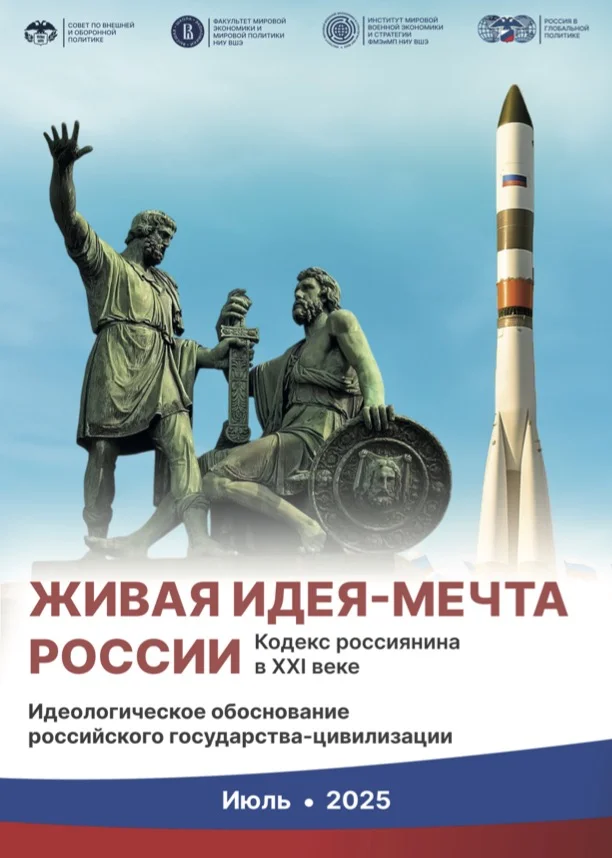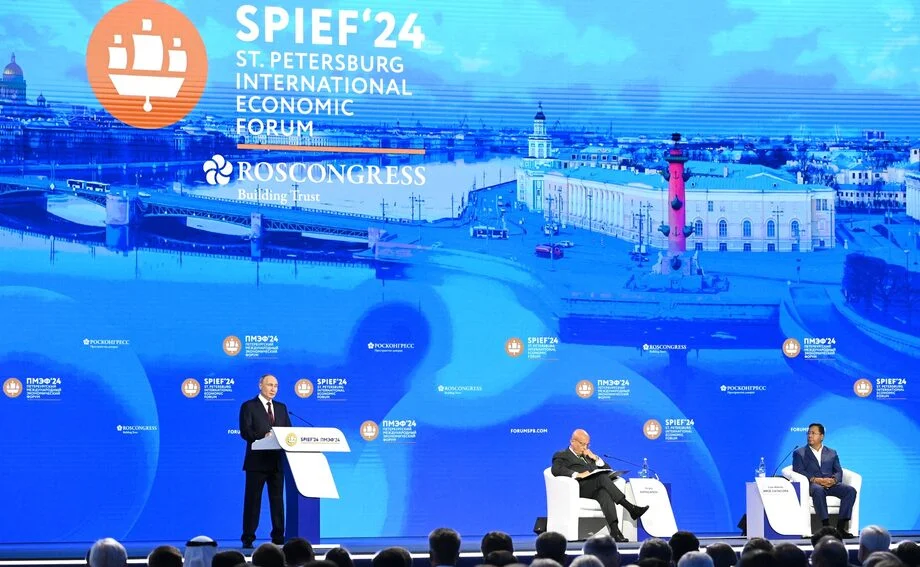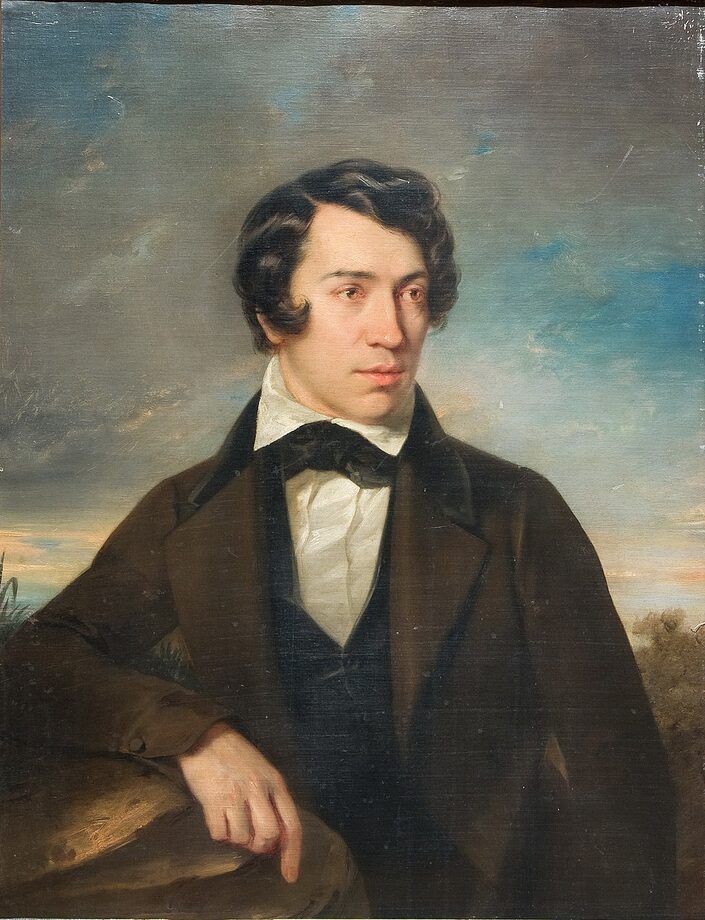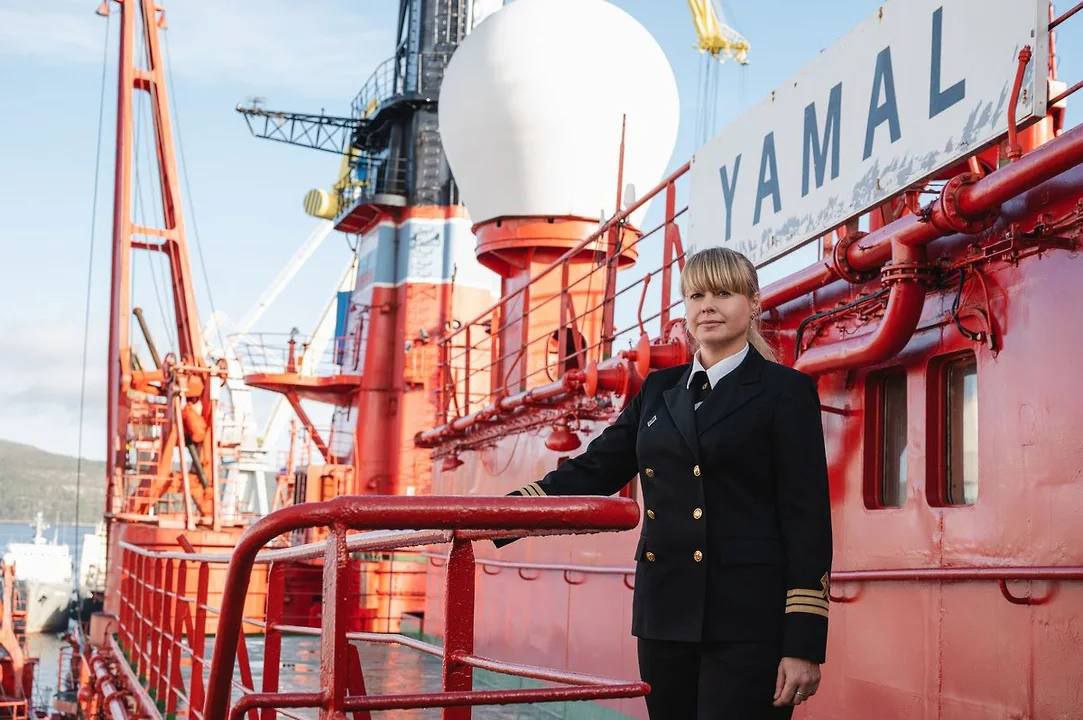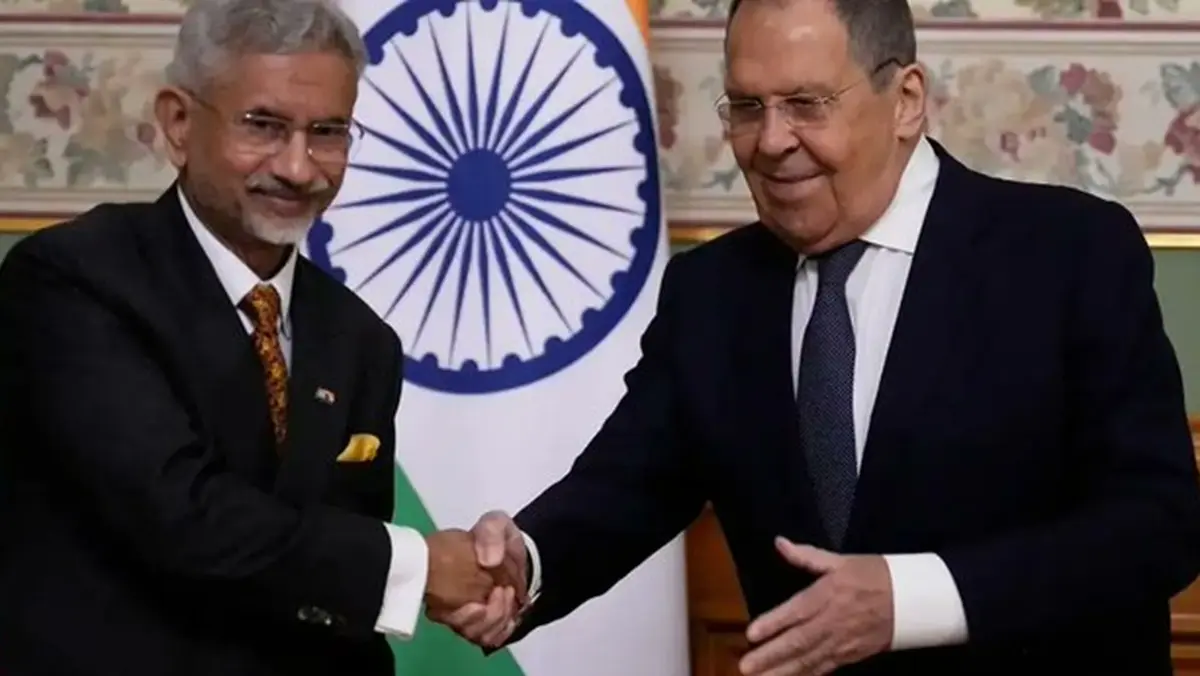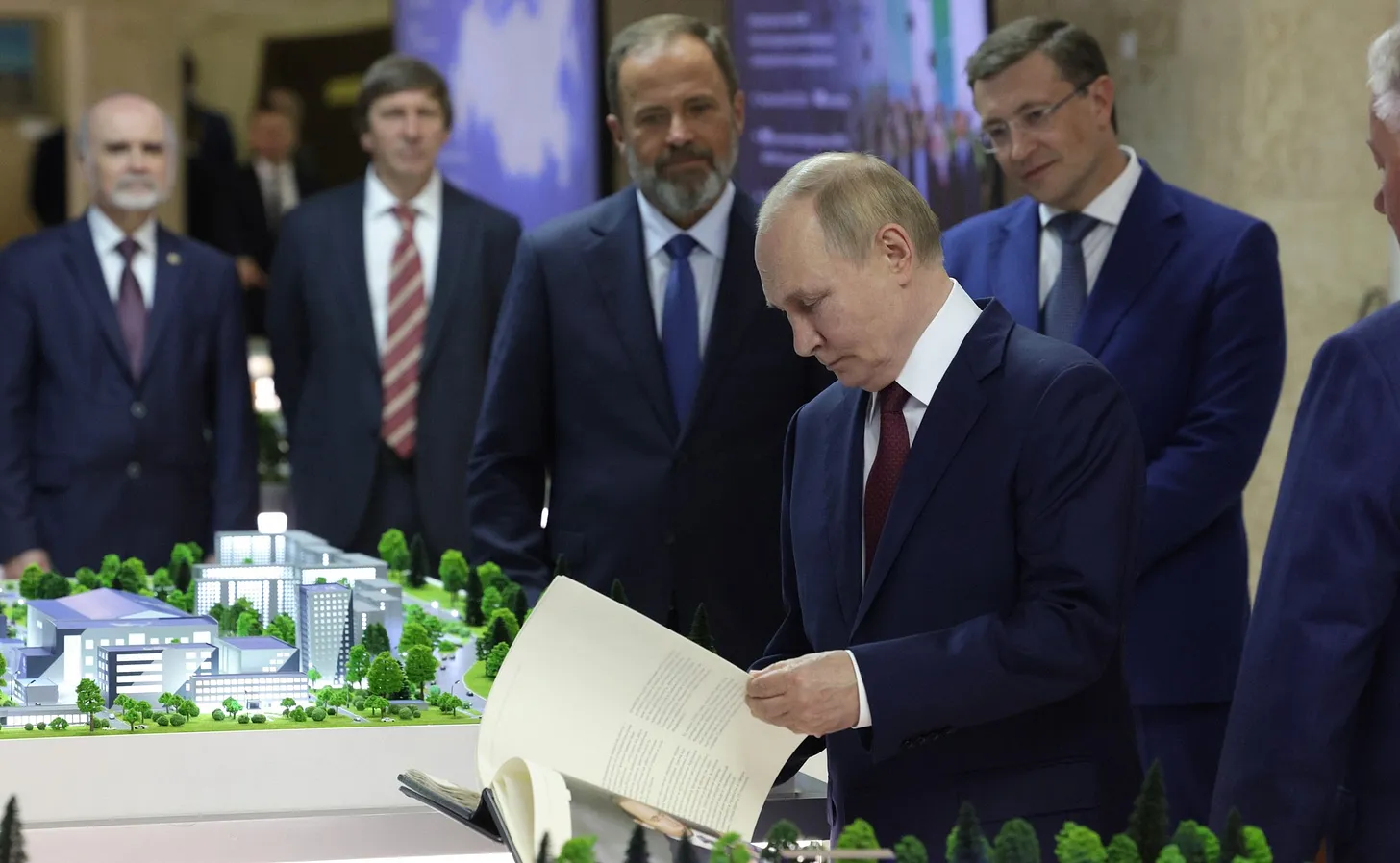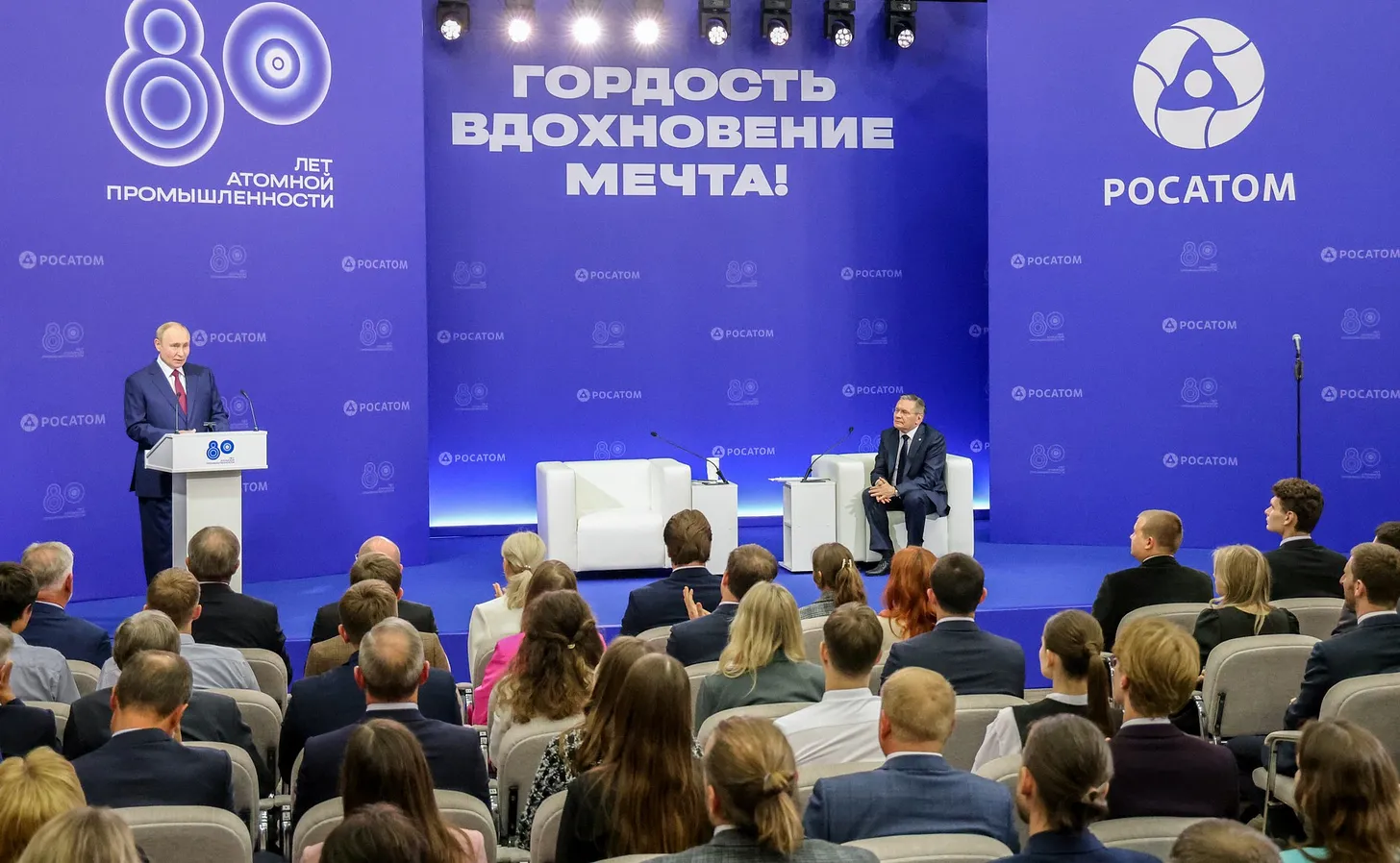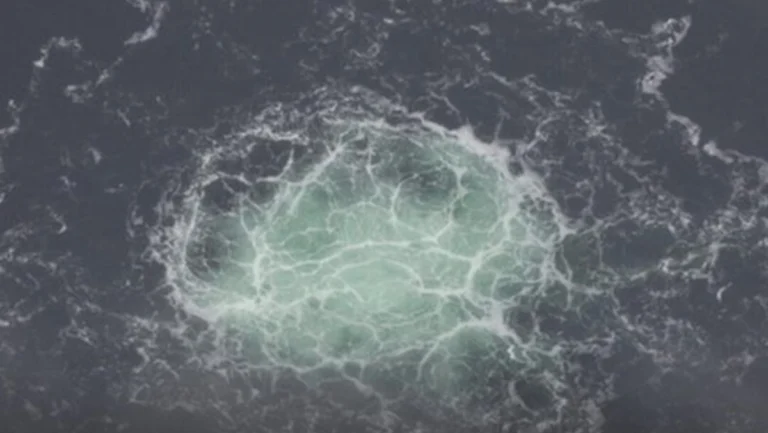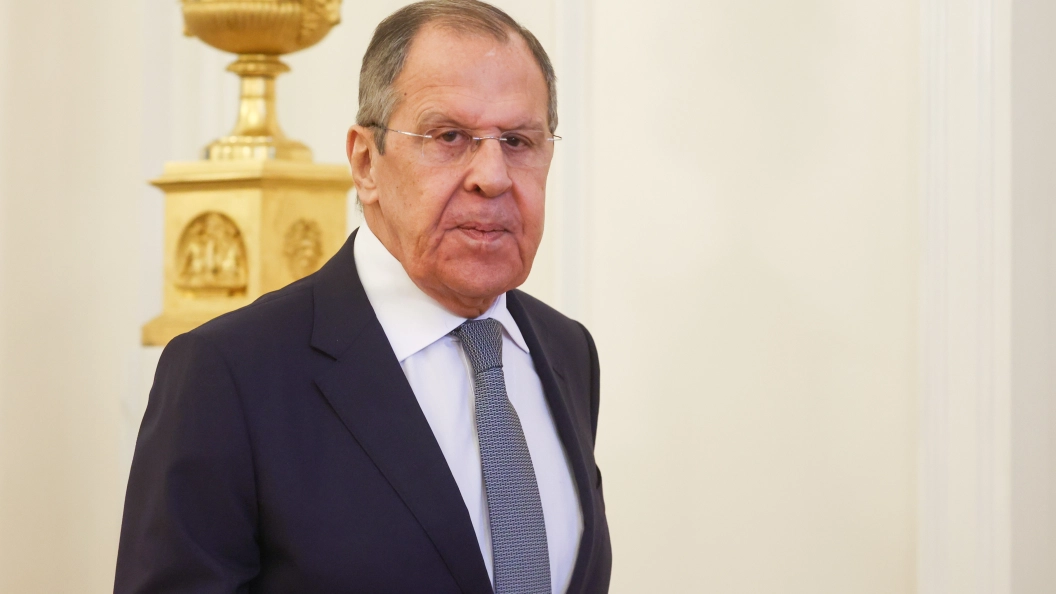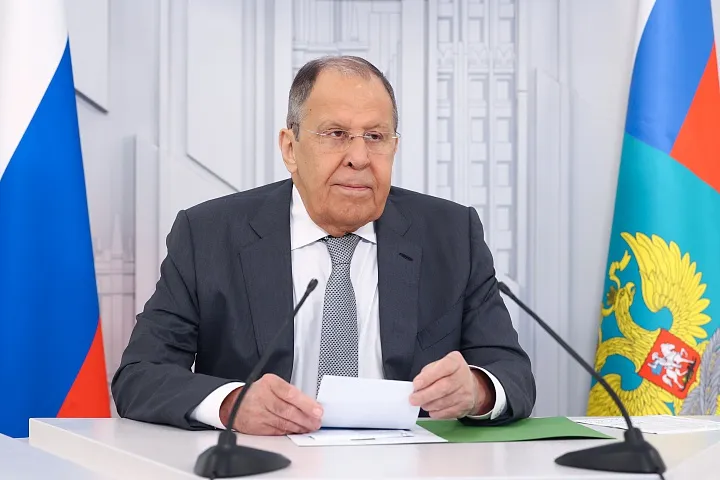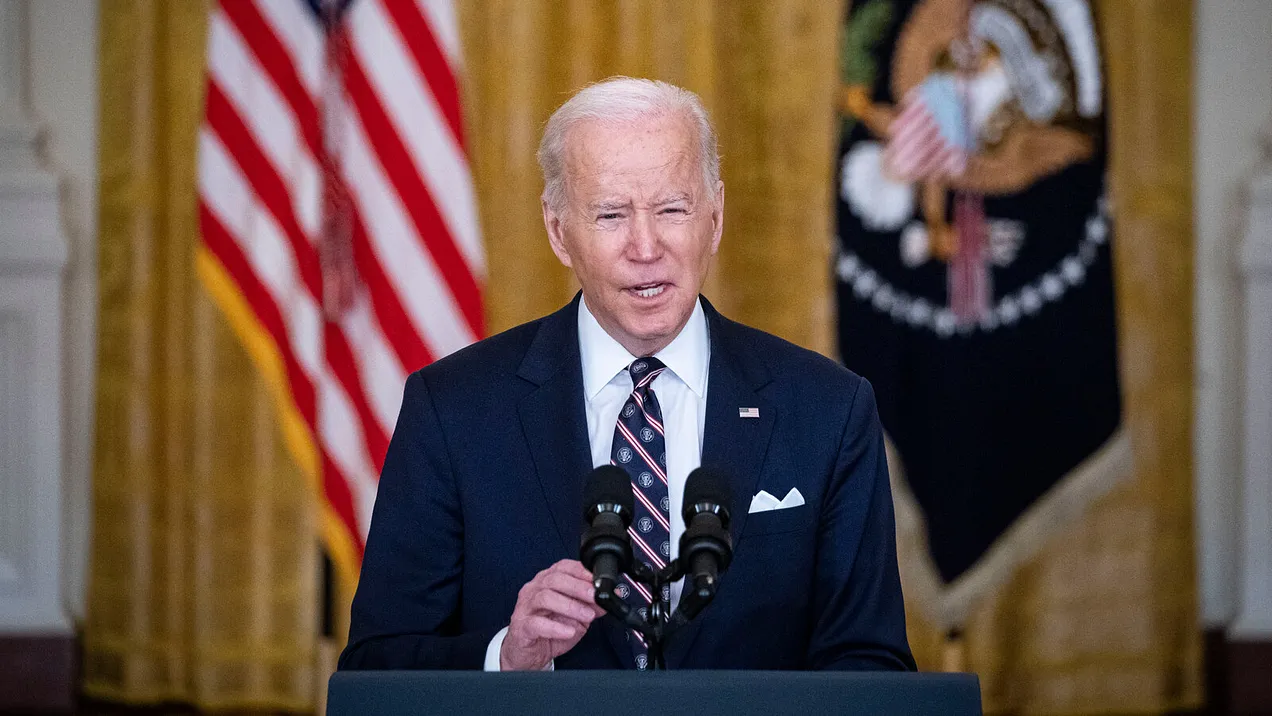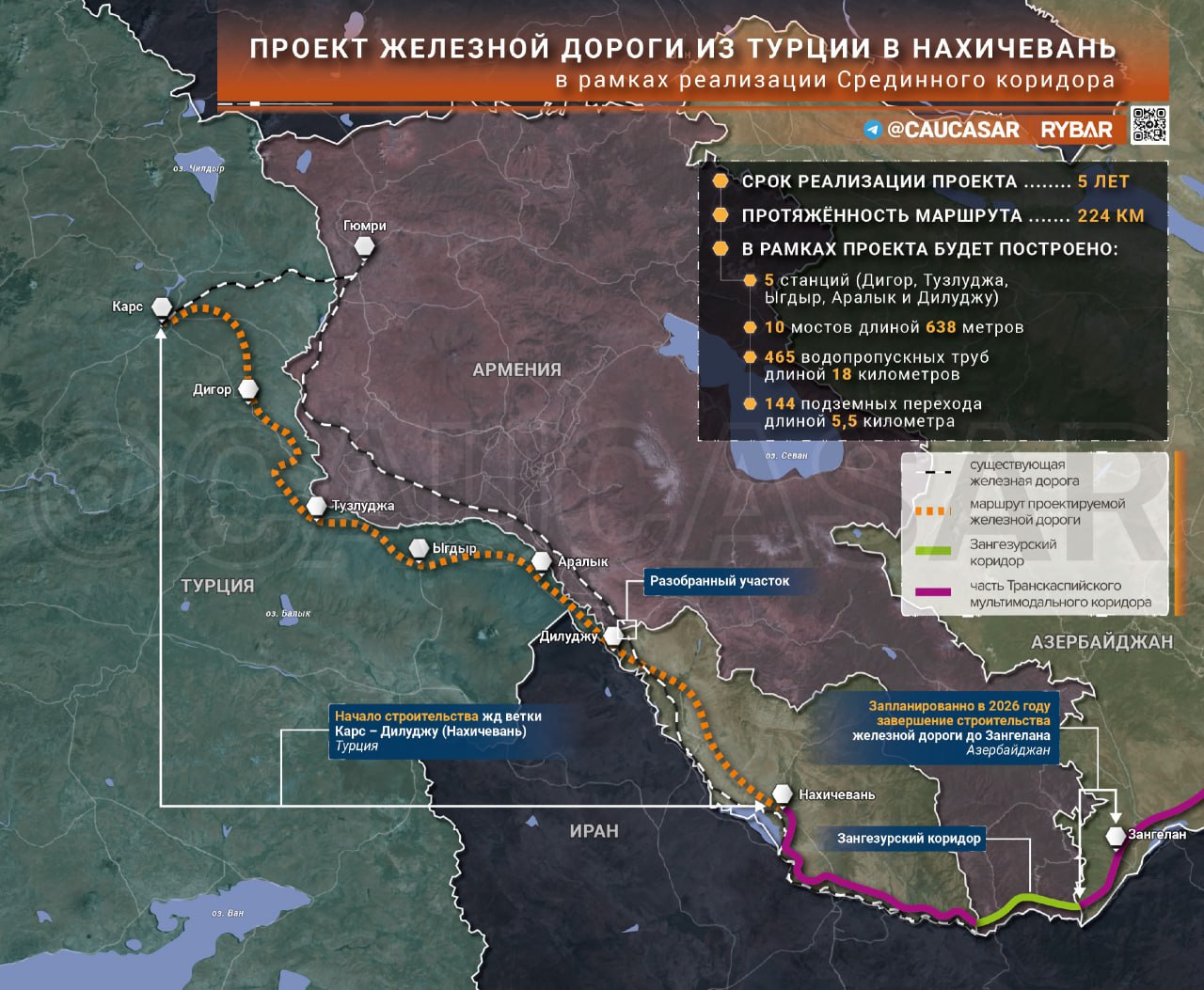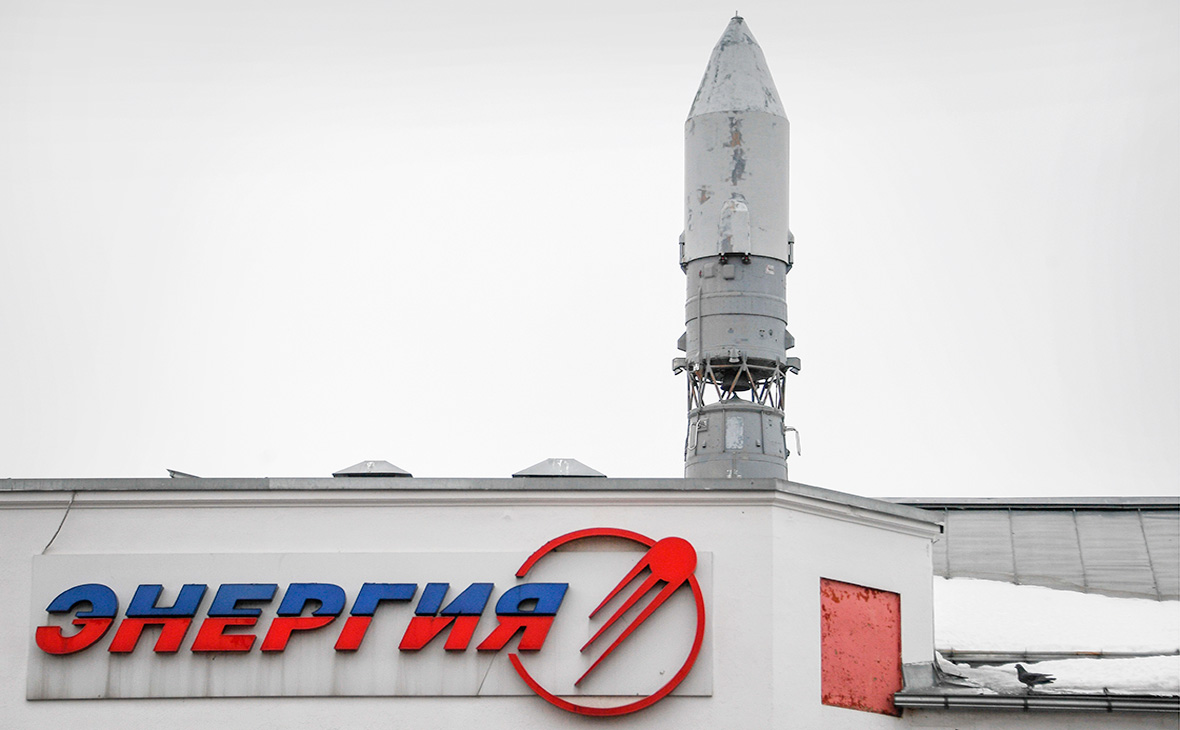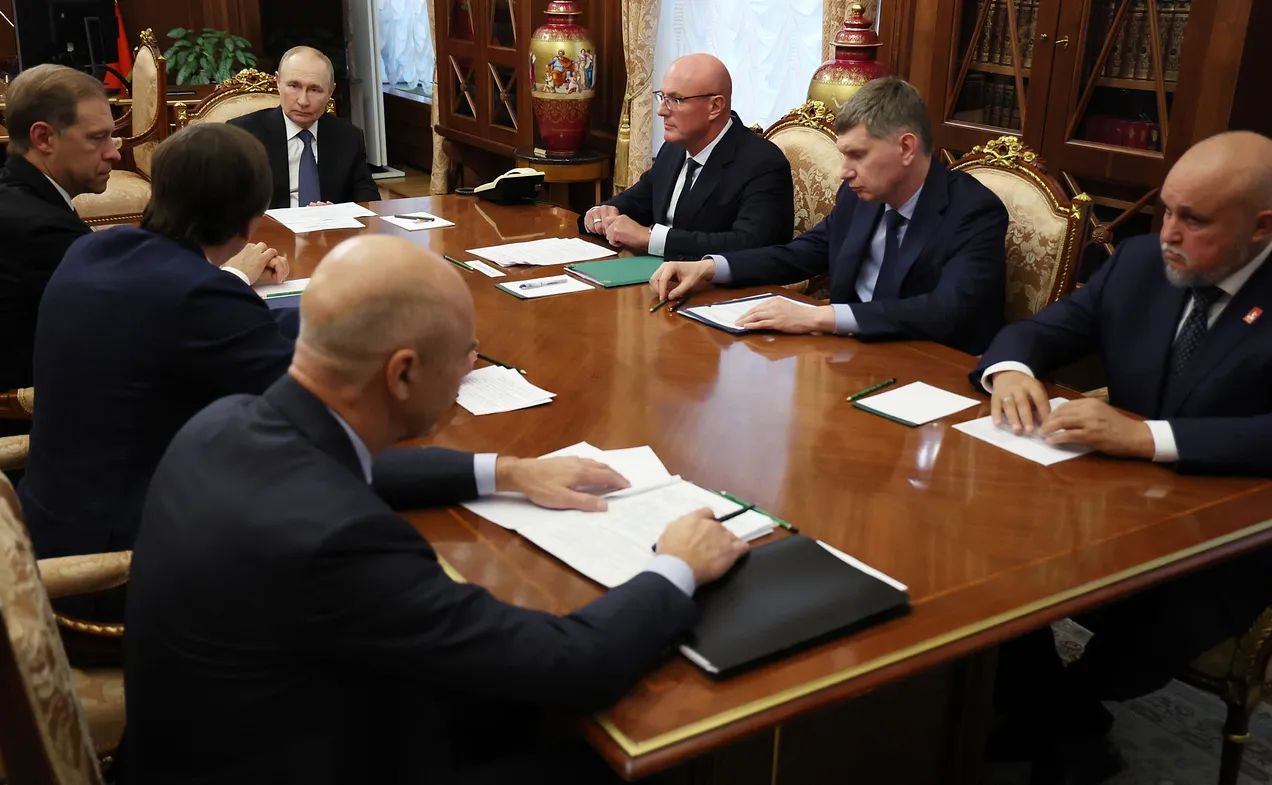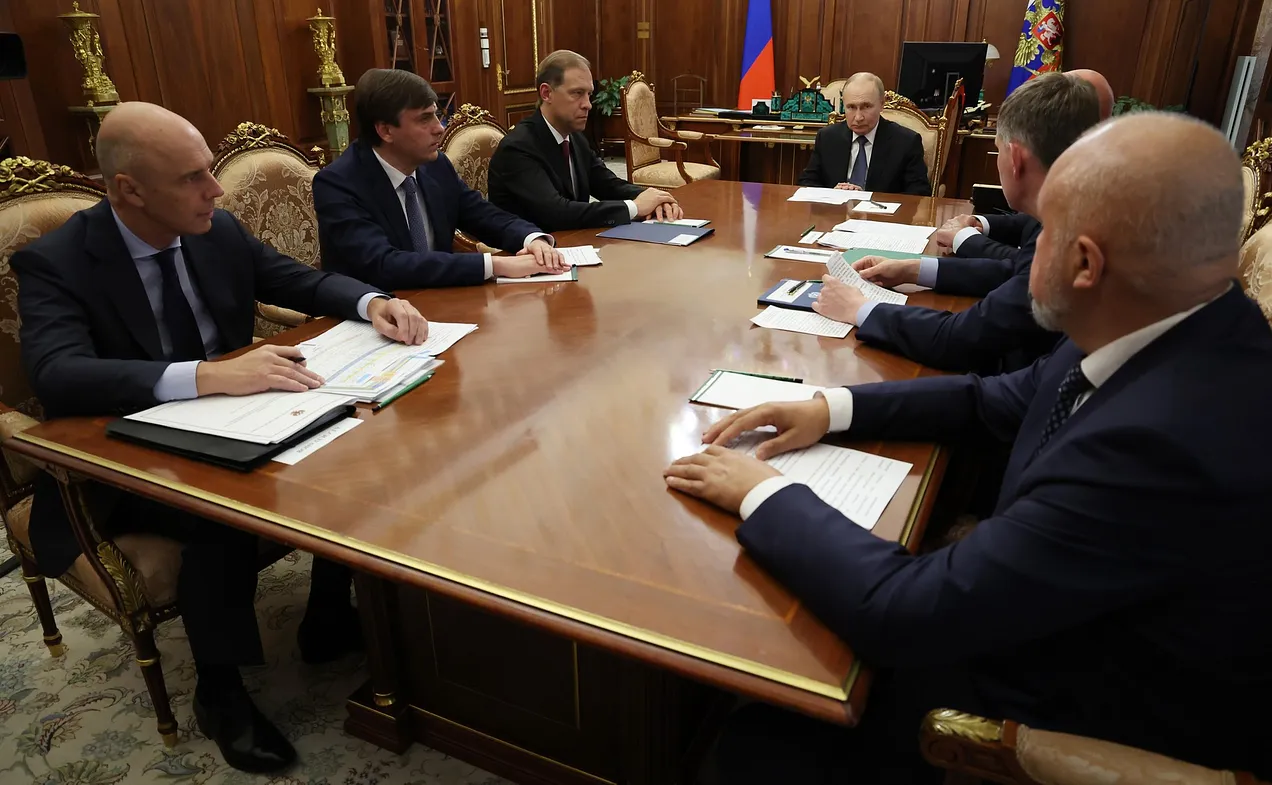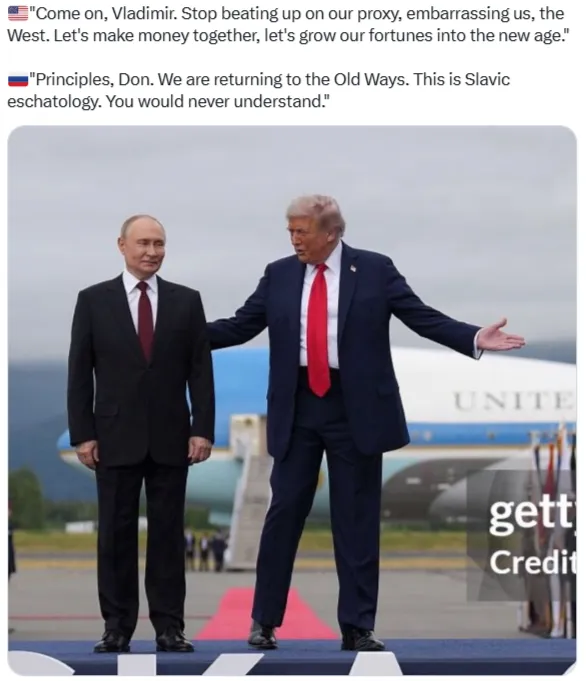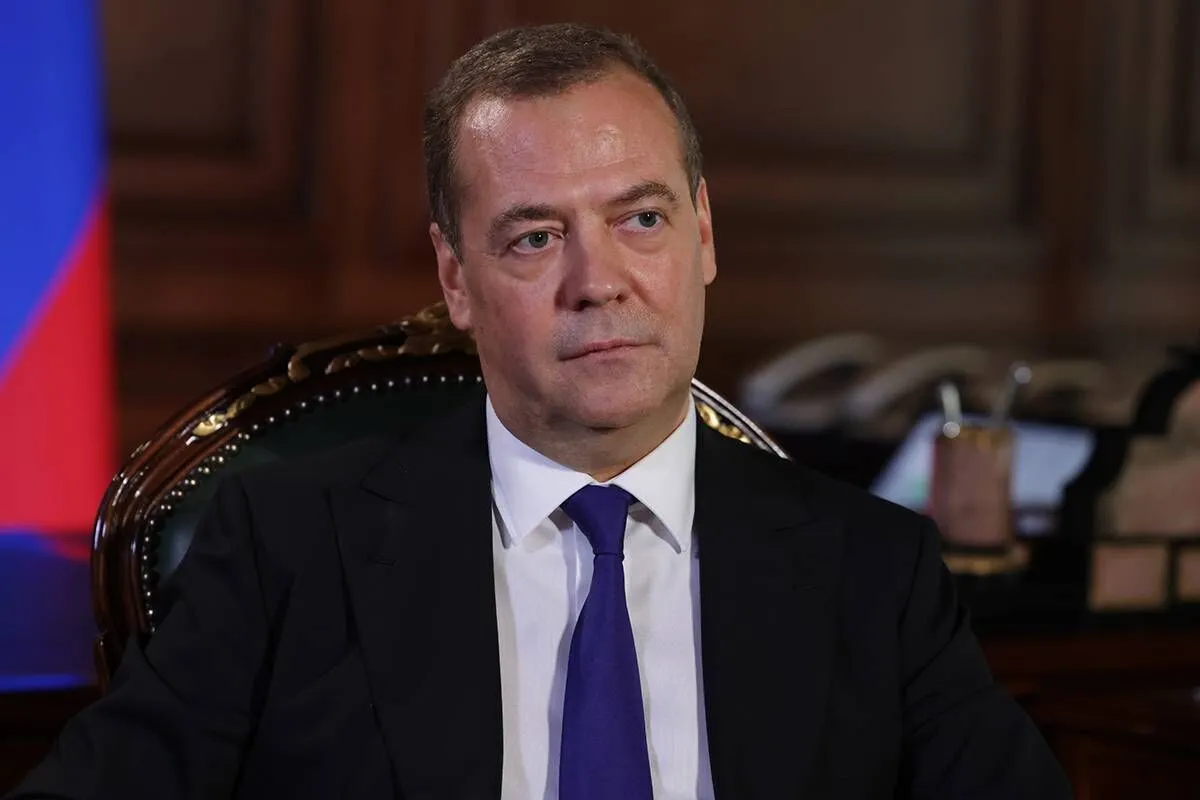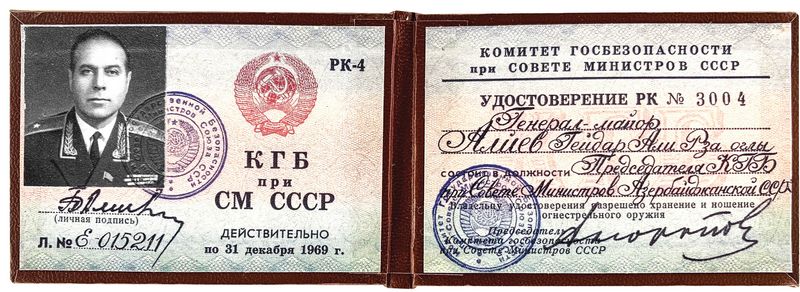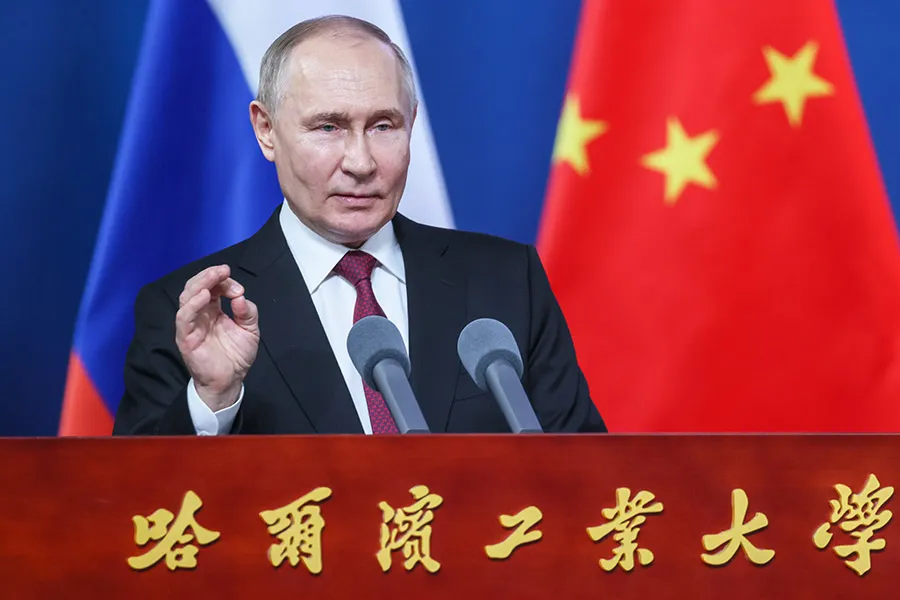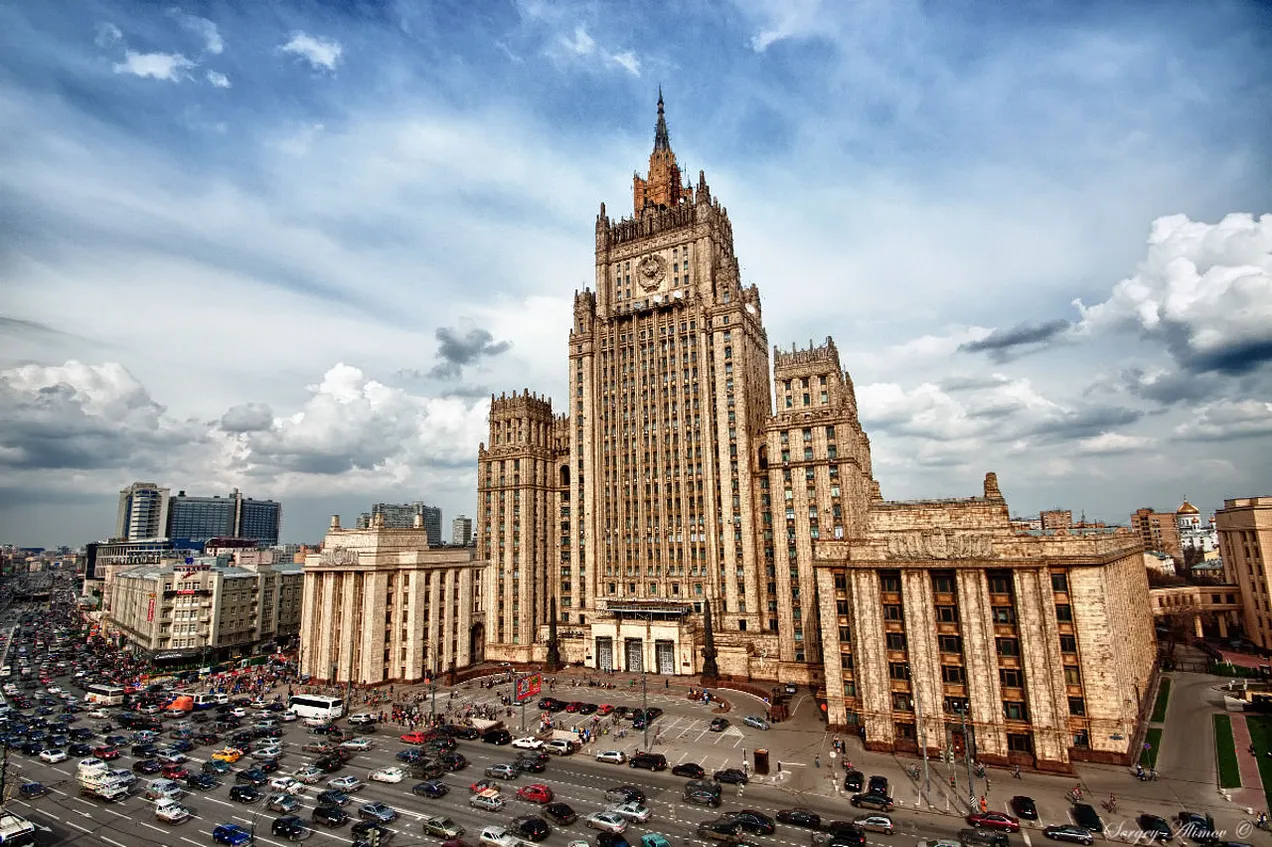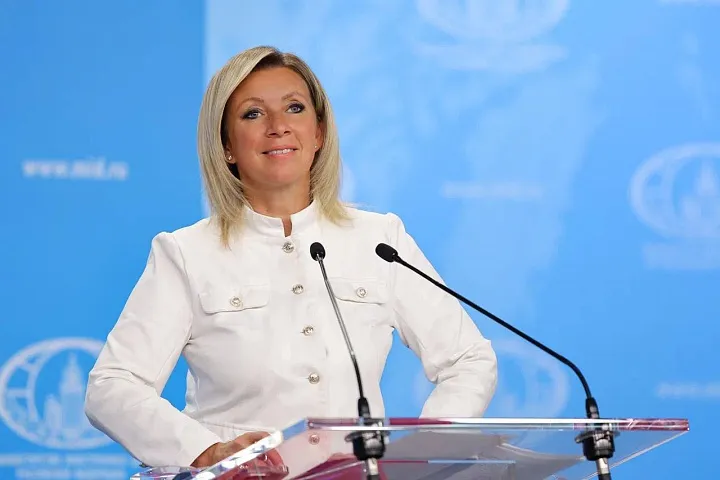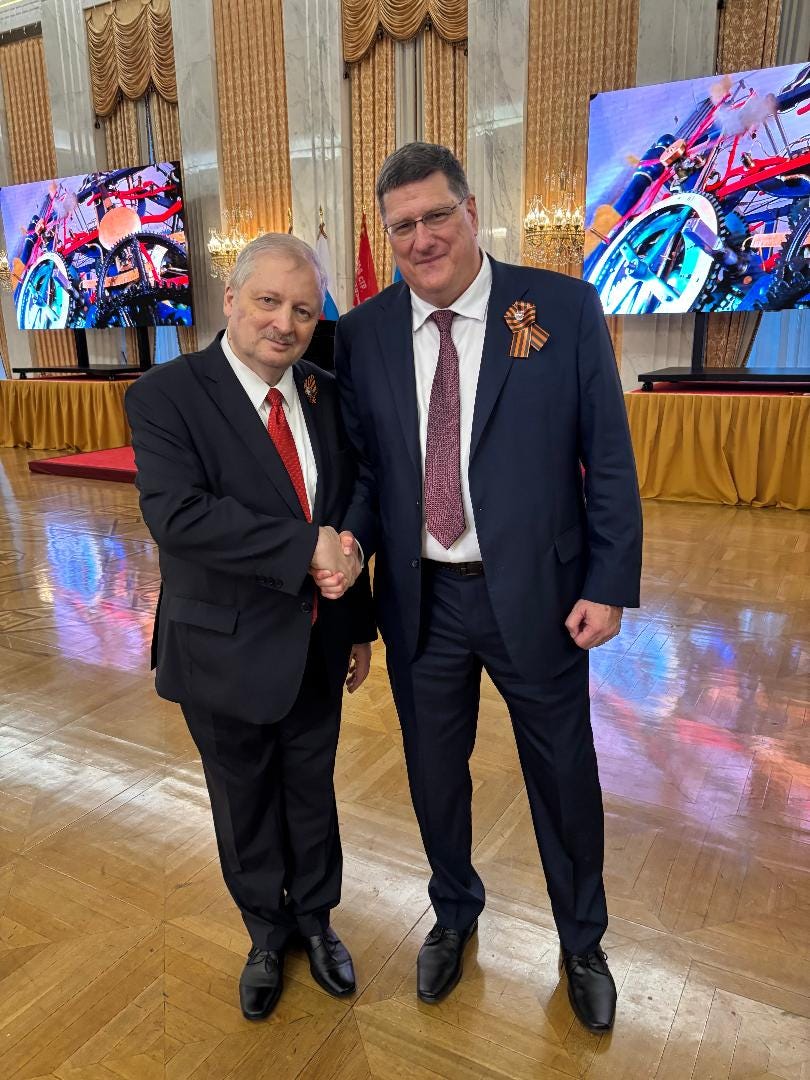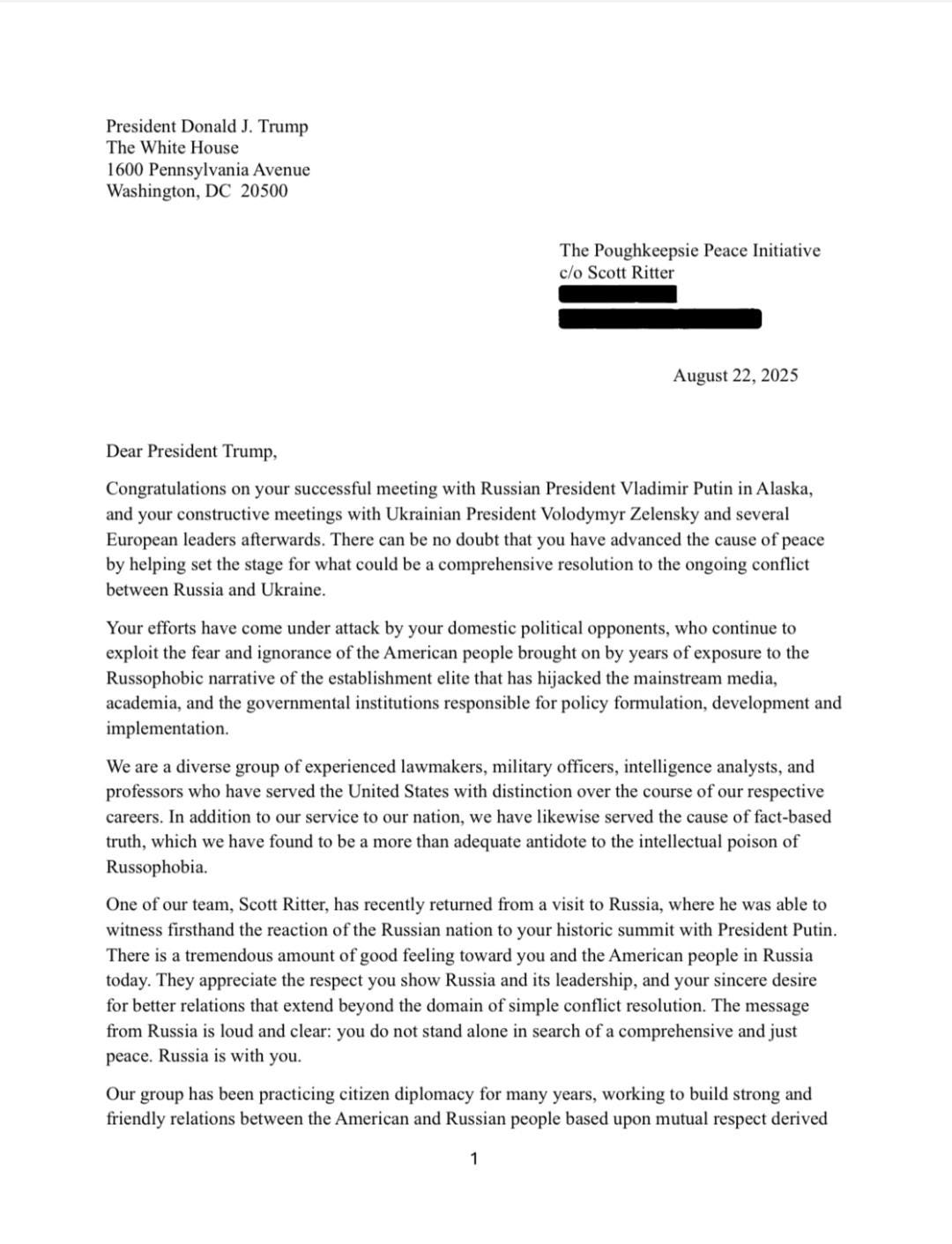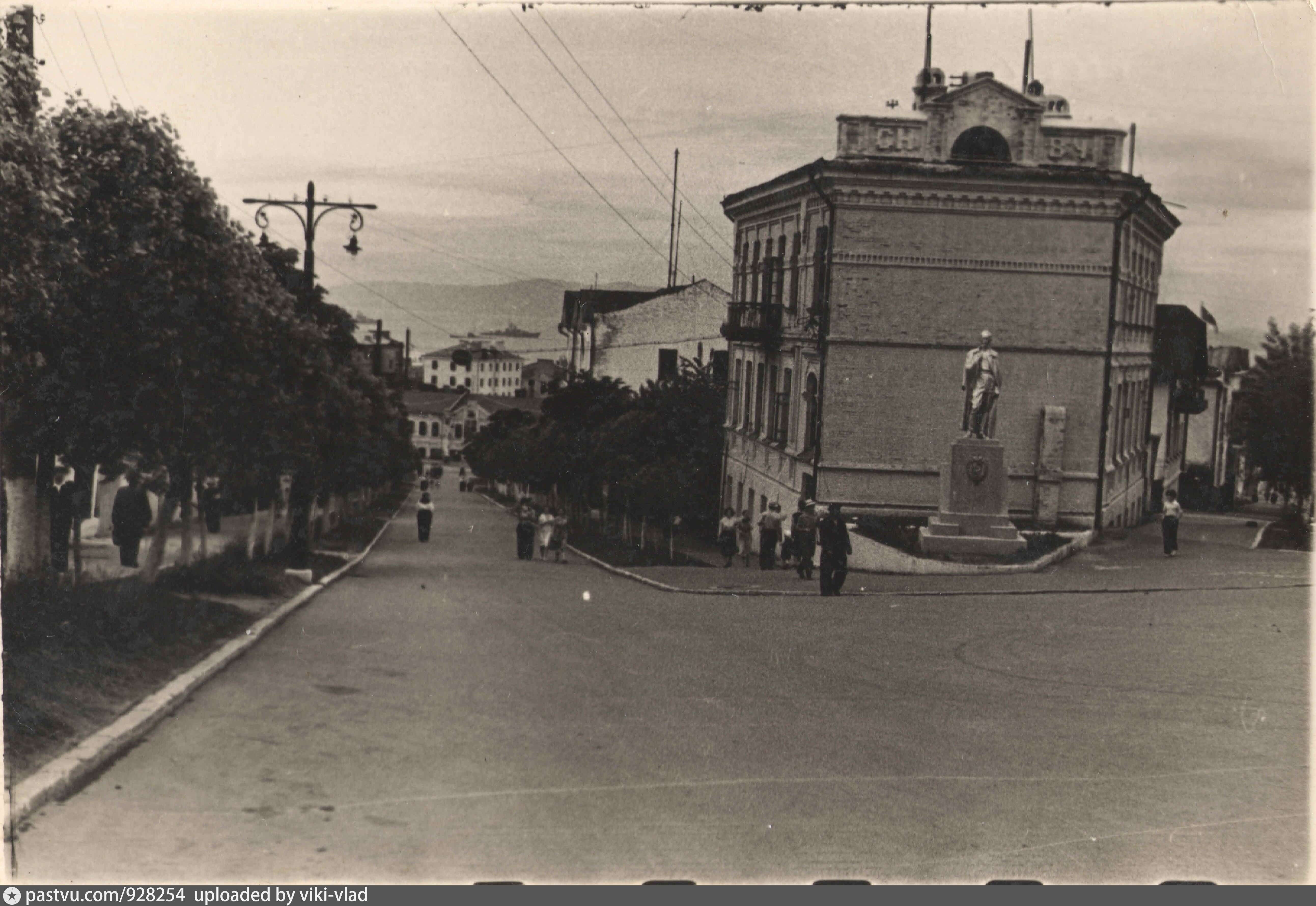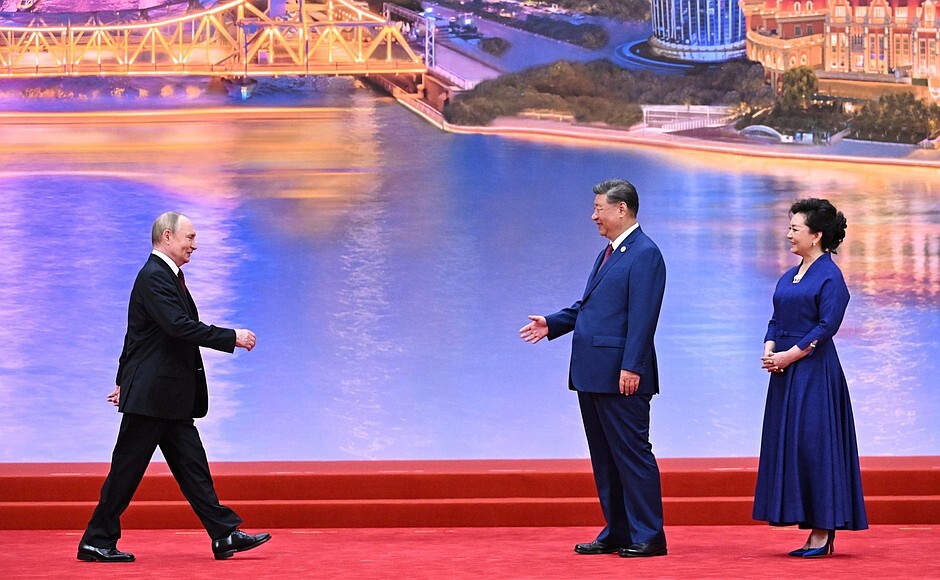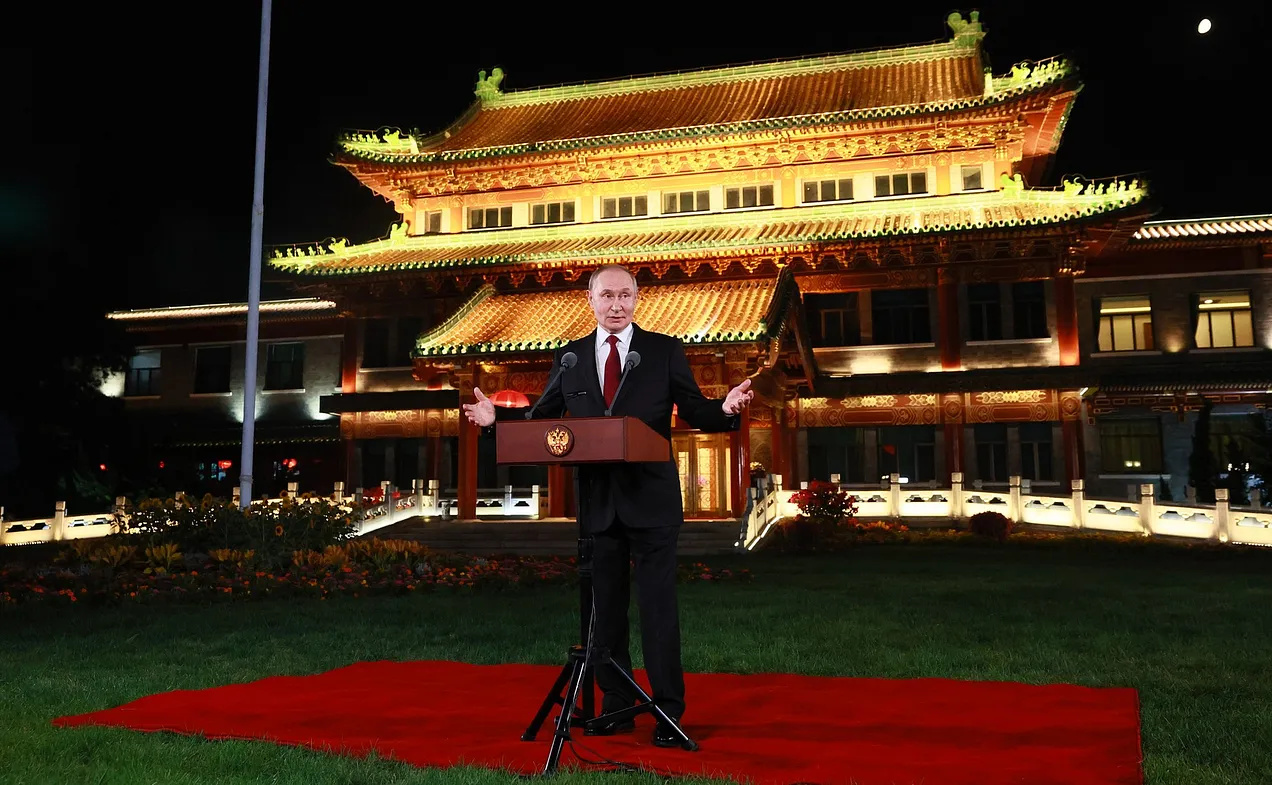The President viewed an exhibition on scientific and educational infrastructure in cities of special importance. There are several models on the table each of a different city—scientific centers in Sarov, Snezhinsk, Lesnoy, Zheleznogorsk and Obninsk.
As the caption to the above photo implies, Russia is very serious about science and expanding its research centers along with universities and engineering schools. The Kremlin tells us these people helped explain it all to the president:
After viewing the presentation Putin had an hour-long interaction with young employees of nuclear industry enterprises.
The usual format of Putin making his opening remarks is followed by an award ceremony presented to the team at the Russian Federal Nuclear Center—the Order "For Valorous Labor," which was given to the state Director of the Nuclear Center Valentin Kostyukov. After the ceremony the interaction begins that will certainly be entertaining and perhaps educational—these sessions usually are:
V. Putin: Dear friends and colleagues!
On August 20, 1945, 80 years ago, a special committee was established in our country to organize work in the field of nuclear energy. In fact, this date marked the birth of the domestic nuclear industry. Taking this opportunity, I would like to once again congratulate you on this anniversary, all those who work in the domestic nuclear industry. This is a significant force, with nearly half a million people involved. How many people are there in total?
A. Likhachev: 420 thousand.
V. Putin: Almost half a million.
A deep bow to the veterans to whom we owe our security, our powerful technological foundation, and, in fact, our independent, sovereign development. With their talent and titanic will, they have created a strong nuclear shield for our country and were the first in the world to make peaceful nuclear energy work for the benefit of our country and all of humanity.
Scientists, workers, and nuclear engineers performed a true feat in the name of their homeland. They ventured into the unknown, risking their lives and health to assemble the first nuclear weapons, and they built nuclear test sites, stations, reactors, icebreakers, and submarines.
The entire country, which had experienced a terrible war, enormous losses, and destruction, was engaged in tremendous work, relying on the scientific, educational, and industrial potential that had been created both in pre-revolutionary Russia and during the Soviet era. Achieving global nuclear parity was a true victory for our entire nation.
We are proud of the scientific triumphs of outstanding physicists such as Igor Kurchatov, Yuliy Khariton, Yakov Zeldovich, Nikolay Semyonov, and Andrei Sakharov, as well as the energy and dedication of the people who launched hundreds of new enterprises, scientific institutes, and design bureaus, forming a unique scientific and industrial complex.
In order to preserve and enhance this great legacy, the state corporation Rosatom was established in 2007. Sergey Vladilenovich [Kiriyenko] was responsible for its creation. Thank you, Sergey Vladilenovich. This decision set a high pace for the development of the domestic nuclear industry in this historical period, in the 21st century. Today, Rosatom is a [the] global leader in the construction of new nuclear power plants, demonstrating the reliability and environmental friendliness of Russian nuclear technologies.
Russian nuclear engineers were the first to put the safest generation III+ reactors into mass production. They are already creating fundamentally new solutions, such as fourth-generation fast neutron power systems with a closed cycle. This will eliminate radioactive waste and significantly increase the potential of nuclear energy.
Thanks to you and your colleagues, Rosatom is at the forefront of creating and implementing advanced technologies and major infrastructure projects, including the Northern Sea Route, which will become part of the Trans-Arctic Transport Corridor from St. Petersburg through Murmansk to Vladivostok. In Obninsk, Kaluga Region, the largest European plant for the production of radiopharmaceuticals for the diagnosis and treatment of complex diseases, including cancer, is under construction.
Quantum computers make it possible to develop new medicines, vaccines, and materials, as well as to quickly process huge amounts of data. Thanks to the efforts of Rosatom, prototypes of such systems with enormous computing capabilities have already been assembled in Russia. These systems will be in high demand for megascience facilities, including those being developed at the National Center for Physics and Mathematics in Sarov. This is a true center for the science of the future, which is being developed by Rosatom.
This forward-looking vector is absolutely accurate and correct. We need to set big goals for ourselves and strive to make a significant step forward in the development of our economy and the entire civilization.
This is primarily about the work in the field of controlled thermonuclear fusion, which was initiated by the great Evgeny Pavlovich Velikhov. Thanks to the existing foundations, developments in this area are already being used to create a wide range of applied solutions, and Russia is at the forefront of knowledge and technology in this field. These unique advantages must be further developed in close cooperation with Russia's leading scientific centers.
The same kind of fruitful cooperation is necessary within the framework of another large-scale project. I am referring to the creation of a space system with a special power plant and a so-called space tug based on a nuclear installation. Such solutions open up fundamentally new prospects in the exploration of deep space.
In general, such programs are of national, and perhaps, without exaggeration, global significance. Colossal in scale, they are designed to strengthen the country's defense capabilities and sovereignty, and, crucially, to expand opportunities for creativity and self-realization among talented young people, schoolchildren, and students who aspire to work in the nuclear industry.
I am absolutely convinced that the young people, all generations of Rosatom specialists, as well as your great predecessors, are capable of achieving any and all goals, no matter how difficult they may be. This applies to both civilian and defense tasks that involve the potential of Russia's nuclear industry. I would like to reiterate that you have undoubtedly proven this through your outstanding achievements.
Therefore, on the occasion of the industry's anniversary, more than 1,400 Rosatom employees were awarded state awards for their significant contributions to the industry's development.
I would also like to note that a decree has been signed awarding the title of Hero of Labor of the Russian Federation to Viktor Igorevich Ignatov, Director of the Kalinin Nuclear Power Plant, and Andrey Alekseevich Karavaev, a turner at the Chepetsk Mechanical Plant.
Today, I will be pleased to present the Order of Valorous Labor, which was awarded to the staff of the Russian Federal Nuclear Center, the All-Russian Research Institute of Experimental Physics, where we are currently located.
I would like to once again congratulate all the employees and veterans of Rosatom on this holiday, which is so important for all of us and for our country. Let me wish you new successes. Thank you.
(Award ceremony.)
V. Kostyukov: Dear Vladimir Vladimirovich!
On behalf of the team and on behalf of all the residents of Sarov, we would like to thank you for your high praise of our work.
The scientists and specialists of the Russian Federal Nuclear Center are fully responsible for everything that has been entrusted to us. We will implement everything. Thank you.
A.Likhachev: Dear Vladimir Vladimirovich, you have been working here on the Nizhny Novgorod land, in Sarov, in the place where the nuclear industry of our country was born 80 years ago, for more than an hour. And we have gathered in the hall not only the young people of the nuclear weapons complex, but also our power engineers, those who are engaged in science, new areas of activity. They are eager, Vladimir Vladimirovich, to ask you questions.
Of course, we've been preparing, but I'd like to say a few words before we begin this very important event.
Vladimir Vladimirovich, thank you very much, thank you for coming.
V. Putin: Please.
May I address the audience directly? They are all intelligent people. Please do not ask me difficult questions.
A. Likhachev: Thank you, Vladimir Vladimirovich.
I won't be forgiven if I don't say a few words. Look, we all appreciate and remember everything down to the day and minute: how you came in March 2000 after the elections, made decisions on the nuclear and weapons complex, the energy sector, gave orders to enterprises, and introduced bonuses for the most important workers. I cannot emphasize enough the decision to establish a state corporation.
A separate topic is our exports. You have not only created a support system, Vladimir Vladimirovich, but you are also the main representative of Rosatom in international negotiations. I have seen this many times. You have made nuclear policy a priority in our foreign policy.
Thank you very much. And thank you for encouraging us with your assignments. We have something that wasn't even available in the great Ministry of Medium Machine Building. Mechanical engineering, the Northern Sea Route, materials science, nuclear medicine, and many other things have made us stronger in recent years, and we hope that they will continue to make our country even stronger.
Thank you very much.
If you don't mind, let's move on to the questions. I imagine that you never need any moderators or intermediaries when talking to the audience. Perhaps you'll allow me to introduce our first participant in the discussion, Vladimir Kryukov, a representative of the peaceful atom. He works at the Leningrad Nuclear Power Plant. Despite his young age, he has already built four nuclear power plants and is responsible for supplying equipment for the construction of new nuclear power plants.
Please, Volodya.
V. Kryukov: Dear Vladimir Vladimirovich, good afternoon!
It's a bit of an excitement, as it's not every day that you get the opportunity to meet the head of state and ask them questions directly.
V. Putin: We are fellow countrymen. It's simple!
V. Kryukov: Okay, Vladimir Vladimirovich.
Yes, I started my career at the Leningrad Nuclear Power Plant, almost from the very beginning of my studies. I started as an economist, and now, as Alexey Evgenievich said, I am the Deputy Head of the Department. Back in 2007, when all of this happened, it was thanks to your decrees that the construction of the Leningrad Nuclear Power Plant-2 began, to replace the existing capacity, for which I am also very grateful.
As of today, Rosatom has 35 units and 11 nuclear power plants, and about 20 percent of the country's energy balance. According to the approved master plan, we will have to build 38 nuclear power plants by 2042. This will allow us to achieve a 25 percent share of nuclear energy, in line with your instructions...
V. Putin: In the energy balance.
V. Kryukov: Thank you, Vladimir Vladimirovich. In the energy balance for our country.
This is an ambitious task that inspires our team, because we appreciate your attention to our industry, and that's for sure. Alexey Yevgenyevich has already said this. But there are some aspects, at least in my opinion, that are important in the implementation of major investment projects,such as the construction of nuclear power plants. The first is political will, which we have thanks to your support. The second is money. I was going to ask this question, but I won't, because you've repeatedly spoken about the refinancing rate on television. We're looking forward to its decrease, of course. We understand everything.
And the third aspect is definitely the staff, which you can't do without. But we currently have a shortage of staff, including engineering and construction staff, and there are not enough construction professionals on the construction site in Leningradskaya (the third and fourth blocks).
Is there any possibility of considering a state order for specialized universities in order to increase the number of budget places for the specialties that our nuclear industry needs?
I express my deepest personal respect to you, and I think everyone here does, for your visible and invisible support. I don't think we could have done this without you.
V. Putin: A holy place is never empty.
As for training, this is one of the most important areas in all sectors of the national economy. In the nuclear industry, there is probably no exception, and the same is happening. However, it is necessary to train personnel almost from kindergarten or school. We need early career guidance. This is exactly what we are doing. Perhaps it is not as effective as we would like, but the efficiency is increasing, and the results are improving. This is evidenced by the fact that this year, a significant number of students have chosen physics, mathematics, chemistry, and biology as their main subjects for the Unified State Exam.
In general, interest in engineering professions is increasing. I just met with the Minister of Science and Education, and my colleagues told me that the number of people applying for engineering and, by the way, teaching degrees has increased significantly in recent years. This is also proof that our work is having a tangible impact. However, it is not enough. We will continue to work on this.
It's strange that there aren't enough builders. I understand when there are a lack of specialists...
A. Likhachev: There is a shortage of construction workers throughout the country. It may not be just a matter of quotas and state assignments for universities, but also of systemic solutions to increase the attractiveness of construction workers, designers, and project managers. As we understand, this shortage will be significant, not only in the nuclear construction industry in the coming years.
V. Putin: Let's talk separately about what the nuclear industry needs.
As for special training, you have a lot of work to do. My colleagues have just told me that a whole international center has been established in Obninsk, where both our students and foreign students are studying. There are more than 90 supporting universities, right?
A. Likhachev: Yes. We have more than 50 universities in Russia, and several dozen more abroad, partner universities.
V. Putin: These are all people who are coming to the nuclear industry and will work there. It is probably necessary to come back to this again and again.
You know, I've already mentioned this, but it's definitely necessary to promote engineering activities in your field, as well as work in the nuclear industry. I believe that there is nothing more interesting than what you do. I'm not exaggerating when I say this. It's a unique job that involves understanding Einstein's thoughts and the structure of the world. When asked why he became interested in this field, Einstein replied, "I was curious about how the world works." This curiosity led him to explore the atomic structure and beyond. You are engaged in precisely this type of work. What could be more interesting? What could be more exciting than this kind of activity? You need to be able to present it in a beautiful way and interest young boys and girls from school.
And at school, we are now developing a whole system of working with gifted children. And of course, you should have gifted people first of all, which requires special intellectual qualities. And in general professions, such as construction, it is a very noble industry.
If Rosatom has any special tasks or special requirements, let's think about it and maybe have a conversation. I don't want to delve into what's missing in the construction sector and how or who is filling the jobs there, as it's a separate topic. We need to train our own people now.
A.Likhachev: We have some ideas. We'll bring them to you, okay?
V. Putin: Okay.
A.Likhachev: Yes. Good. Thank you very much.
Vladimir Vladimirovich, of course, there were a lot of questions from the international dimension. First of all, this concerns us. Thanks to your support, we are prominent players in the global market, and we are leaders in the nuclear market. We have a corresponding structure, which can be described as the Russian Atomic Trade Mission, operating in many countries and on all continents. Egor Kvyatkovsky, a young man, has already reached the position of Deputy Chief Atomic Trade Representative.
Come on, Egor, ask your questions, please.
E. Kvyatkovsky: Alexey Evgenievich, thank you very much for the introduction. After such words, I don't think it's a boring question—only a bold one should be asked.
V. Putin: Let's do it.
E. Kvyatkovsky: Vladimir Vladimirovich, I am such a non-classical nuclear engineer, I graduated from the Higher School of Economics and decided to break the stereotype that only technical professions take root in Rosatom. I have been working in the industry for 15 years and promoting Russian nuclear technologies abroad.
Indeed, you correctly noted what we are building today. We are building 22 blocks abroad, and today we have 41 blocks abroad in our portfolio. Very serious figures, we went to them, we go, we execute. Of course, so objectively, after 2022, we refocused, we began to engage very actively in friendly countries, the countries of the Global South, ASEAN, BRICS. In our opinion, it is these countries that are making a huge leap forward in terms of energy consumption in the world, and we see a promising future there. At the same time, we are not abandoning or leaving the Western markets that we used to work in and are currently working in. This requires a lot of effort and is challenging, as we are being pushed out of these markets. We see the policies being imposed on our partners, which objectively threaten our ability to work with them. Nevertheless, we continue to fight for these markets and are not backing down. And of course, I can't help but ask: how can we continue to build the right relationship with the Western world?
We are all nuclear engineers, and we have been following the course of your negotiations with Donald Trump. This is important to us, especially in the international segment. Of course, we, and I personally, would like to know: do you think, Vladimir Vladimirovich, that we should continue to fight for Western clients? Or should we wait for common sense to prevail over political games, while continuing to work constructively with our partners? And overall, where will relations with the United States go? I think that everyone in this room is very interested in this issue. Will we be able to build some kind of constructive, pragmatic cooperation with our Western partners? Thank you.
V. Putin: You said that since the start of the special military operation, we have been building more relations with our partners in friendly countries. We used to work there before. To be honest, have we lost any projects from so-called unfriendly countries?
By the way, we don't have any unfriendly countries; we have unfriendly elites in some countries. And I assure you we have nothing to do with the people of those countries. Of course, propaganda is working there, they're brainwashing people and saying that we started the war, but they forget that they started the war in 2014 when they used tanks and aircraft against the civilians of Donbas. That's when the war began, and we're doing everything we can to end it.
But I'm not talking about that now, but about the fact that where was the main cooperation between us? With friendly countries. Where were our main orders placed? In the People's Republic of China, in India, in Bangladesh, in Turkey, a project appeared, despite the beginning of the Free Trade Zone, and this, by the way, is a NATO country. What is missing from what we had? Finland only. We in Hungary even continue to work (a NATO country and a country of the European Union). First.
Second. We continue to do what we used to do in the countries that you called unfriendly. We still supply nuclear fuel in decent volumes. Do we provide services? We provide services in almost the same volumes. There are some new developments, especially in the field of nuclear medicine and other related areas. This is still the case.
Yes, some things really do cause damage to us, where cooperation stops, especially in science, but work with scientists continues. Look, I came to Gatchina, you know, there is a center there. Specialists from European countries work there, and everything is fine. These specialists from countries with which we have had different relations at different historical stages, they have always worked with us, even when they were creating the atomic bomb. Well, we know very well, I won't go into details now, but many of the specialists who worked in the main office in the United States also collaborated with Russia. They weren't just ordinary spies in the traditional sense. They weren't spies at all. They were just smart people who understood that in order to protect humanity from the genie they were releasing, they needed to create a balance. They did this by helping our scientists work as well. Our people would have done it without this support, but they did it on purpose, and both the German and American specialists did it.
And this community of smart people has never been destroyed, and it will never be destroyed. Science, like sports and art, is meant to bring people together. It has always been this way. I am 100% certain that it will always be this way, and no one will be able to destroy this scientific community.
As for purely pragmatic business-related issues, we have enough orders. We are the number one company in the world today. Rosatom is the absolute leader in global nuclear energy. No other company in the world builds as many facilities in general or as many facilities abroad.
I just said this from the podium, and it speaks to the quality of Rosatom's projects. It speaks to their safety and environmental friendliness. And there's another important aspect: we don't put our partners on the hook to build something and then create a market for them, keeping that market under our control. Instead, we create an industry, train personnel, and provide opportunities for equipment production and localization.
You know, the specialists from our partner countries understand this, and they highly appreciate it, which is why the management of Rosatom is able to build such kind, friendly, and long-term relations. I am confident that this will continue.
And those who somehow leave the stage of our interaction as a result of political pressure, I am sure, they will return. And many, I repeat, are working now, and many will return.
As for our relations with the United States, they have been at an extremely low level since the end of World War II, as I have said many times. However, with the arrival of President Trump, I believe that there is a glimmer of hope at the end of the tunnel. We have had a very good, meaningful, and frank meeting in Alaska. Our ministries, agencies, and companies are continuing to engage in dialogue. I am hopeful that these initial steps are the beginning of a full-scale restoration of our relations. But it doesn't depend on us; it depends primarily on our Western partners in the broad sense of the word, because the United States is also bound by certain obligations within various alliances, including the North Atlantic Treaty Organization. Therefore, the next steps depend on the leadership of the United States. I am confident that the leadership qualities of the current President, President Trump, are a good guarantee that relations will be restored. I hope that the pace of our joint work on this platform will continue.
A. Likhachev: Thank you very much.
In the international aspect, not only business and commercial projects are very important. Humanitarian cooperation is also very important, and we are actively engaged in it, including within the Academy.
Alexander Kormishin, the director of this center, would also like to ask a related question.
A. Kormishin: Alexey Evgenievich, thank you.
Vladimir Vladimirovich, I graduated from the Moscow State Institute of International Relations, and as a student, I became very interested in the BRICS, Youth, and Energy link. Over the past 10 years and seven youth energy summits, we have managed to build an entire dimension of youth energy cooperation among the BRICS countries.
It is important to note here that young foreigners see Russia as a global technological and energy leader. I would like to take this unique opportunity to thank you, as it was during Russia's chairmanship in 2020 that the countries of the Union, represented by their leaders, supported youth energy cooperation and have continued to do so. This is a significant support for the entire team.
And all this experience is reflected in my current work at Rosatom. I am promoting Russian nuclear energy technologies among young foreigners and young leaders. We assure you that we are working hard to attract foreign talent. The Obninsk Tech project is an example of how we are bringing young and talented allies of the Russian nuclear industry together with Rosatom.
In September, as part of the Global Nuclear Summit, we will host 100 of the best young nuclear industry representatives from around the world, from about 40 countries. And we plan to discuss global challenges on the horizon of 2050.
Vladimir Vladimirovich, I have a question: what are the most pressing challenges that you would identify? What challenges should we pay attention to as young people? And if possible, what would you recommend to us, the young people who are working with young foreign leaders today?
V. Putin: I think that you can already recommend anything to anyone. As for the challenges, you know, the essence of the challenges has not changed over the centuries. For a country like ours, the ability to maintain its sovereignty is extremely important, simply the most important. There are countries that can exist without sovereignty. Today, Western Europe has almost no sovereignty. There are many other countries that are doing well. Russia cannot. With the loss of sovereignty, Russia will cease to exist in its current form, and this is absolutely certain. In order to ensure our sovereignty, guarantee our existence, and ensure our development, we need to overcome the challenges that time presents.
At the time, we were talking about the technological breakthrough in the Soviet Union, which was actually associated with two projects: the atomic project and the missile project. This led to a massive collaboration within the Soviet Union, with science expanding in various fields. As a result, we established a nuclear shield and a missile shield. This shield provided protection for the entire country, its economy, and social infrastructure, ensuring its continued existence and progress.
And what are the challenges today? Artificial intelligence. Just imagine: new technologies based on artificial intelligence, genetics, and other areas, which you know better than I do, will determine not only the efficiency of the economy, but also the development of defense, science, and everything else. However, these areas are interconnected. The efficiency of the economy, and thus the country's defense capabilities, as well as biology in a broad sense, will depend on this. We must focus our attention and efforts on this, as well as our administrative resources and financial capabilities. This is what education should be focused on. These are the challenges we face.
You know, I don't want to go back to the same point all the time, but it's the most painful one for us. This is all that happens on the line of contact. I have just spoken with your own Rosatom employees, who took part in the fighting, fought heroically, and some of them were seriously injured. What do I want to say? Every month, I say without exaggeration, and even six months for sure, the conditions and methods of conducting an armed struggle change. It is only necessary to fall behind for a few weeks, and losses increase sharply or the dynamics of progress on the contact line decreases. A few months is enough, and that's it.
I won't talk about the significance of various weapons, what is effective, when and how armored vehicles, artillery, drones, unmanned aircraft, unmanned boats, and so on were used. But they are thinking about it every day. The effectiveness of using one weapon today is decreasing. Why? Because the other side has understood what we are doing and has made appropriate technological decisions within a few weeks. The effectiveness of using modern weapons is rapidly declining. We have people who are engaged, thinking, making decisions, and the efficiency increases to 80-85 percent. This happens every day. Do you understand?
We need to set up the whole society to do what needs to be done. We all need to live in an intellectual environment of science and education. I'm not saying anything new. Everyone who feels comfortable in this environment needs to set themselves up to learn always, constantly, every day. These are the challenges we face and will continue to face. We need to understand and recognize this.
But it's also very important to realize that we can overcome all these challenges, and we will.
A.Likhachev: Vladimir Vladimirovich, let me return to our national agenda. Just one day ago, we held a gala event dedicated to the 80th anniversary, and we presented a captain's certificate to Marina Starovoitova, our employee, making her the first female captain of an atomic icebreaker. This became the global news of the day, as it marked the first time in history that a woman became the captain of an atomic icebreaker.
Here are the girls from Atomflot, who are just a few steps away from this position. In particular, Nina Vdovina, the second assistant captain, is exactly two steps away from this high rank.
Nina, please ask your question.
N. Vdovina: Thank you very much.
The nuclear industry is breaking not only the ice, it is also breaking the stereotypes. I am from a hereditary family of sailors. My great-grandfather, grandfather and mother worked at sea. Now my brother and I are continuing the maritime dynasty, and I am very proud of the fact that I work in the world's only nuclear icebreaker fleet.
I have a question about global logistics. You have consistently made the following decisions: you have appointed Rosatom as the operator of the Northern Sea Route to ensure navigation and the construction of Arctic infrastructure, and you have also transferred FESCO, the country's oldest shipping company with experience in Arctic navigation, to Rosatom.
Also, in March 2025, you instructed the Government, together with Rosatom, to develop a new route, the Trans-Arctic Transport Corridor. Of course, we understand the scale and scope of this task. It inspires us all, especially the young people who come and work on it, including people like us. Girls also come there. I have been helping to develop the Northern Sea Route for six years.
I would like to hear, Vladimir Vladimirovich, why the Northern Sea Route is important to you.
V. Putin: It's not important to me, but it's important to our country. It's been developing in the Soviet Union and Russia for a long time. Since when, Alexey?
A. Likhachev: We've been here since 2018.
V. Putin: No, when did the Soviet Union start talking about this?
A. Likhachev: The Soviet Union began, well, from the very first days of the Soviet Union, Arctic expeditions were organized.
V. Putin: Yes, that's right, of course. At that time, the Northern Sea Route didn't sound like that, it was just being studied, and it might not have had any practical significance at the time. However, there were already discussions about the possibility of traveling from Arkhangelsk and Murmansk to our eastern borders. Last year, we transported...
A. Likhachev: 38 million tons.
V. Putin: Almost 39.
A. Likhachev: No, 37.8.
V. Putin: Well, almost 38 million tons, but still a multiple increase. And in connection with climate change, as you know, everyone is already talking about it, there is reason to believe, so let's say cautiously, that the volume of transportation can and will increase dramatically due to the increase in navigation. But even if this does not happen, and we have such an icebreaker fleet that we are planning – we have eight nuclear icebreakers, no other country in the world has such a fleet, and we are planning to build four more in the near future, I think…
A. Likhachev: We already have one on the water, one on the slipway, the decision on two has almost been made, and the fifth, the Leader, is under construction.
Vladimir Putin: In my opinion, now together with the "Leader" four. He is [A .Likhachev] is already casting the bait for another one. Well, okay. In any case, they are needed, it is definitely obvious. If we still have such a fleet, and it will definitely remain, we still have 35 diesel icebreakers, in my opinion. No one has such a powerful fleet. And the most acceptable route so far lies in our territorial waters, or in our special economic zone. So, these are our competitive advantages. And of course, it would be foolish of us not to develop this route, because many countries around the world are interested in using it. It's clear that it significantly reduces the time it takes to transport goods from the Atlantic to the Pacific Ocean and throughout the Asia-Pacific region, which is developing at an unprecedented pace for the Western community. Of course, we will do this without a doubt.
Among other things, it should be understood that there is no secret here, and the issues of Russia’s defense capability are also largely related to research and the use of northern latitudes. Well, there is nothing secret here, I can tell you. Our strategic nuclear submarines navigate beneath the ice of the Arctic Ocean and disappear from radar screens. This is our military advantage. Research in this area is crucial for us.
And finally, in addition to transport logistics and defense capabilities, there is a third factor. The Arctic region is home to vast reserves of mineral resources. We have already started working in this area, and several of our companies, including Novatek, a major player in the natural gas liquefaction industry, are actively engaged. They are working in collaboration with various partners, both European and Asian. By the way, we are also discussing with our American partners the possibility of working together in this area, not only in our Arctic zone, but also in Alaska. Moreover, no one else has the technologies we possess, and this is of interest to our partners, including those in the United States.
So, this is the Arctic zone and the Northern Sea Route, and your work there has great prospects and is developing very well. I wish you success.
I'm looking at you, and I'm wondering what you do. You're the second assistant captain. It's crazy. I thought you were a student at school, but you're the second assistant captain.
I wish you every success.
A. Likhachev: Thank you very much.
Vladimir Vladimirovich, we know that this event is not the end of your program in Sarov, and there will certainly be more business in Moscow. Vladimir Vladimirovich, can I ask you one or two more questions?
V. Putin: Three.
A. Likhachev: Three. Okay. Good.
Then a question to the youngest participant, he is still half a student, his last name is Kuznetsov, his first name is Vladimir Vladimirovich. He is the leader of the "SSR" – the Community of Rosatom Students, but he is already an employee of the state corporation. He was elected alternatively at a large conference.
Volodya, come on.
V. Kuznetsov: Good afternoon, Vladimir Vladimirovich!
I am currently enrolled in the master's program at the Moscow Power Engineering Institute and am already working at NIKIET, a nuclear weapons complex enterprise.
Two years ago, Alexey Evgenievich proposed the creation of the Rosatom Student Council. Since then, we have grown into a community. Currently, our community includes students from all over the country. Recently, we held a major conference in Moscow, where we gathered as a team to discuss the future of our students. Our goal is to help them discover their talents and find a meaningful purpose in life.
I also have my own dreams, which are, first of all, to be useful to my country. And secondly, to create a large, strong family.
Vladimir Vladimirovich, I think many people will be interested to know, so please tell us, what are your dreams?
V.Putin: About making sure that you succeed. This is my job, my goal.
A. Likhachev: We can't help but return to the family of nuclear scientists. The Kursk region, the city of Kurchatov, and the Kursk Nuclear Power Plant have been in the headlines this year. I would like to give the floor to Yegor Petrov, one of the hereditary leaders of the Kursk Nuclear Power Plant.
E. Petrov: Alexey Evgenievich, thank you.
Vladimir Vladimirovich, good afternoon! I am indeed a hereditary power engineer, a hereditary nuclear engineer. My grandfather worked at the Kostroma Thermal Power Plant, my father works in the nuclear industry, and my younger brother works at a nuclear power plant. After graduating from the Moscow Engineering and Physics Institute, I immediately started working at a nuclear power plant. Now, my son is 11 years old. I ask him, "What do you want to do?" He says, "I want to work at a nuclear power plant like my grandfather and father." Time will tell, but let's just say there's a good chance of continuing the family dynasty.
Vladimir Vladimirovich, you were in Kursk not so long ago. You know that we are actively building the first unit of the Kursk NPP-2.
V. Putin: It's impressive, to be honest.
E. Petrov: I think that I will not exaggerate if I say that the first unit of the Kursk NPP-2 was being constructed and continues to be constructed, put into operation in unique conditions. In the sense that, probably, there were no other power units in Russia, in the world, and, God willing, there will be no other power units that would be constructed in the conditions of the hostilities in the territory of the region.
I want to say that I am extremely proud of the team that is working on the construction of this power unit. I am talking about the builders, the operators, and the staff of the operating and under-construction stations, because these people did not flinch or step back in the face of danger. They continued to work calmly in their positions.
And now I can confidently say that we will have a launch on the first power unit this year. We plan to make an energy launch by the end of the year. We are also completing the main stage of construction work on the second unit.
Moreover, Rosatom has started implementing a project to build the third and fourth units at the Kursk NPP-2, which will result in the Kursk Region becoming home to Russia's largest nuclear power plant with an installed capacity of 4.8 gigawatts.
In this regard, Vladimir Vladimirovich, it is not even a question, but a request to consider the possibility of partial distribution of electricity, taking into account the new capacities, in favor of the introduction and development of new industrial capacities in the Kursk Region.
Thank you.
V.Putin: I think that this is quite logical and should be done. I am sure that the Kursk region, as well as what has been damaged in other border regions, will be restored. And we will, of course, pay attention to the development of both small and medium-sized businesses and large enterprises.
The government is currently preparing a programme for the restoration of everything that has been lost and damaged in all the border regions: Kursk, Bryansk, and Belgorod. This programme will be implemented. As you know, we are helping people who are currently unable to return to their homes due to the mined territory. Active work is currently underway in this area. We also want to create favourable and attractive conditions for economic activity. Naturally, we will consider using some of the energy from the Kursk Nuclear Power Plant.
And in general, do you know what is happening now? We have in previous years, in 10 years, the growth rate of use, of electricity consumption was approximately 1.3 percent, and last year–-more than 3 percent increased.
A. Likhachev: By more than 3 percent, in my opinion.
V.Putin: Yes, more than 3 percent. There was a 1.3 percent growth, and now it's over 3 percent, which means that the rate of electricity consumption in the country has increased by more than two times. This is a good indicator, of course, for the Kursk region and for the entire border region. We will create the necessary conditions for development. One of these conditions is, of course, reliable electricity supply. We will definitely consider using energy from the Kursk Nuclear Power Plant. Thank you.
A. Likhachev: Vladimir Vladimirovich, I cannot help but add that the employees of our Kursk station not only managed the existing facilities systematically, but also did not reduce the pace of construction. Our builders provided significant assistance in strengthening the defense capabilities of the Kursk region.
V. Putin: I know, the director told me.
A.Likhachev: Yes, [Alexander] Khinshtein and I are currently working very actively on this issue.
V. Putin: I know, the director told me.
A. Likhachev: They're great guys, of course.
V.Putin: Your specialists worked despite the fact that the fighting was nearby, and some of Rosatom's employees fought, even getting seriously wounded. I have just spoken with them. Rosatom holds a strong, reliable, and very honorable place in all the life-support systems of the Russian state.
Thank you very much.
A.Likhachev: Vladimir Vladimirovich, probably, and by the law of the genre, should sum up, ask the last question, say the last words our official youth leader, the chairman of our great youth council Maria Zotova. She is a native of Sarov, so, probably, all the stars converged here, Masha, on you.
M. Zotova: Hello, Vladimir Vladimirovich!
Thank you, Alexey Yevgenyevich.
Vladimir Vladimirovich, I'm a third-generation nuclear engineer, and I was born in Sarov. My parents worked at the All-Russian Scientific Research Institute of Experimental Physics. However, I never dreamed of pursuing a career in nuclear engineering; instead, I aspired to become a ballerina, which I pursued for six years.
V. Putin: You look like a ballerina.
M. Zotova: Thank you.
My family's total experience in the industry is 72 years. My grandfather was a liquidator at the Chernobyl Nuclear Power Plant, and my father was a test pilot. This, of course, shifted the focus from ballet to my return to Rosatom. However, I haven't lost my sense of rhythm, as I spent 14 years working at the Afrikantov Design Bureau, designing RITM-200 reactor units, which are the heart of the icebreaker that Nina sails on.
To be honest, all the work, both youth work and professional work, has made me think about the fact that the main idea for which nuclear scientists work has always been very important. And over the 80 years that we have been working, we have gone through different stages, and of course, the first main idea for us, for our young scientists, for Khariton and Flerov, was to preserve peace on this earth.
Then Igor Vasilyevich Kurchatov gave us the main idea when he said that the atom should be a worker, not a soldier.
Then there were difficult times, although I was very young when the perestroika years were, but our enterprises, it was a very difficult time for people, because there were no orders, no salaries, in Sarov it was so difficult that sometimes there were no products. And our young parents, my own, coped with it. The dedication and loyalty to the cause, which I think every nuclear engineer is famous for, and in this hall as well, allowed them to stay and preserve this industry.
In 2007, you gave us a new idea: to become a global technological leader. Now, we, the young people, are wondering what the main idea for the nuclear industry is for the next period.
V.Putin: The nuclear industry remains one of the most important areas of our activity. And these areas are well known to you: defence, science, education, and energy. And the area is expanding to include related fields where these unique knowledge and technologies can be applied. I have already said, and you know this better than anyone else, that healthcare and other areas, as well as materials science, are all important.
You know, it seems to me that the most important achievement is not even a specific industry, although each of them is of great value, but the fact that we have created industries of knowledge, production, and technology, which are one of the foundations of the very existence of the Russian state at this stage of our development. And this creation began 80 years ago, and we have come a long way in this development, and we have achieved unique results, which I would like to congratulate you on. I wish you new successes.
Thank you very much.
A. Likhachev: Thank you very much.
Colleagues, just for a moment, for ten seconds. We all understand, or rather, we all feel, how much responsibility Vladimir Vladimirovich is carrying right now, how busy he is, how enormous his workload is. You came to visit us for the whole day, you devoted your time to us. So thank you very much. We will not let you down. Thank you.
V. Putin: Thank you very much.
Gee, how many want to work for Rosatom? A new technology that gets very litte print or other notice is quantum computing which Putin noted is also on the list of tech things Rosatom’s involved with. Also unmentioned aside for the shipyard now doing the work are the new ice-class container and other ship types being built specifically for the Northern Sea Route. But if you want or have kin that want to be scientists or hi-tech builders, Russia’s the hot spot to learn and build a career. There are no such opportunities in the West on the scale that exists in Russia. And who can resist Putin’s selling the world of science—Don’t you want to learn how it all works?
Putin also spoke forcefully about the reality of the current geopolitical and conflictual situation in which Russia finds itself. There are several emphasized segments that would be noted in publications, in particular Putin’s words about sovereignty. Recall my recent article about that topic and how Putin reinforced its premise. This remark, however, was probably the most important:
Moreover, no one else has the technologies we possess….
Minor progress in the Yeltsin Center. Following a request from the Communist Party of the Russian Federation, the deputy director of the Yeltsin Center with an Israeli passport was fined 45,000 rubles for discrediting the Russian Armed Forces. She passed the minimum.
Following a parliamentary inquiry from the Communist Party of the Russian Federation, the leadership of the Yeltsin Center began to be held accountable.
It became known recently that a court in Yekaterinburg found the deputy director of the Yeltsin Center, Lyudmila Telen, guilty (
) of discrediting the Russian Armed Forces and imposed a fine of ₽45,000. According to the case materials, on February 25, 2022, she published an "anti-war post" by Tatyana Yumasheva, the granddaughter of the first president of Russia, Boris Yeltsin.
The Communist Party of the Russian Federation consistently opposes the glorification of the Yeltsin period of our country (
), especially in the difficult modern conditions. Today, when the country has found itself involved in a serious international confrontation, largely dealing with the consequences of the criminal collapse of the USSR, the rejection of socialism, as well as the destruction and plunder of public property carried out during the reign of Boris Yeltsin, the existence and development of "Yeltsin Centers" in our country seems not just strange, but also frankly destructive. In recent years alone, the communists have held many actions (
) against the activities of the EC.
Moreover, representatives of the "Yeltsin Center" do not hesitate at all today to openly speak out with a systematic anti-Russian, anti-historical and anti-Soviet agenda.
In May 2025, in connection with the developing situation, I sent a parliamentary inquiry (
) to the Ministry of Internal Affairs, the Investigative Committee and the Prosecutor General's Office of the Russian Federation.
In particular, I pointed out the participation of a representative of a foundation associated with the Memorial organization, recognized by the court as an extremist organization, in an event dedicated to the 80th anniversary of the Victory. There, formulations were voiced that directly contradict the historical truth and current legislation. Links were given to specific fragments of speeches posted in the public domain on Telegram and VK Video — the case materials were transferred to the Verkh-Isetsky District Court of Yekaterinburg. Thus, our position was specifically confirmed by the actions of the law enforcement system.
As a result, today we can confidently state that we have achieved recognition by the Russian judicial system of the violation of the law by representatives of the Yeltsin Center (
).
This is the first, but not the last step. Such structures, if they are engaged in distorting historical facts, must bear responsibility for this - not only moral, but also administrative, even criminal. No "cultural mission" can cover up ideological sabotage.
For us, communists, this is not a fight against any individual "museums" or exhibitions - this is a fight for historical truth, for the honor of the Soviet soldier, for the people's right to know their real history, and not one rewritten according to class-hostile and Western patterns. The USSR defeated fascism. The Soviet people saved Europe. Soviet socialism gave the country many gigantic socio-economic and scientific-technical achievements. And if someone, using institutional wrapping, tries to slander these truths today - we will not remain silent.
Good, but not enough. A fine of 45,000 for an Israeli citizen is nothing. The subversive activities of the "Yeltsin Center" continue anyway.
In this case, joint efforts of both communists and non-communists are needed to speed up the closure of this bedbug infestation.
And in general, it seems strange that people with passports of other countries occupy socially significant positions in our country.
P.S. The Yeltsin Center should certainly be closed. And sooner or later we will see it. Like with the closure of Memorial, Novaya Gazeta, Ekho Moskvy and other trash.
Political scientist Sergei Markov, whom the Ministry of Justice today added to the list of foreign agents, said that he was added there by mistake and that he is Putin's man, whom he has supported for 25 years. Markov considers his inclusion on this list unjustified.
The Ministry of Justice reports that the reason for adding political scientist Markov to the register of foreign agents is his participation in the creation and dissemination of messages and materials of foreign agents and organizations whose activities are considered undesirable in the Russian Federation.
As I understand it, this is part of the same story as the expulsion of Gusman from official media. Apparently, the event where Gusman and Markov spoke on the topic of Azerbaijan had an effect. The crisis turned out to be systemic, and not a temporary fluctuation. And using the stories of Gusman and Markov as an example, the state is sending an unambiguous signal.
The bite with Azerbaijan is serious and the peak has not yet arrived (the main wave of greetings to Aliyev is expected in the fall). Our state is very slow to harness, but when this bulldozer starts moving, it is better not to get in its way.
I can assume that in the near future we will see new attacks on Azerbaijani assets in Ukraine, arrests of Azerbaijani criminals and a limitation of the influence of Azerbaijani diasporas in Russia (according to the Georgian scheme of the late 2000s).
How those damn Russkies do what they do. Well, here is your answer (part of it) by the Man himself.
That also explains some things related to the Update I gave today. (Video at link.)
And why things happen the way they do. Russia is celebrating the 80th Anniversary of nuclear age in USSR/Russia and creation of a monster of corporation Rosatom.
Aerial view of the Nord Stream pipeline explosion. X/ @France24_en
Moscow draws attention to the ‘protracted and non-transparent’ nature of Germany’s investigation into the blasts.
On Friday, Russia requested an urgent meeting of the United Nations Security Council (UNSC) on the 2022 Nord Stream pipeline explosions, following the arrest of a Ukrainian suspect in Italy.
Dmitry Polyanskiy, Russia’s first deputy permanent representative to the UN, said that the meeting will take place on Aug. 26 at 4:00 p.m. EST (2000 GMT) under the presidency of Panama.
He said Moscow will draw attention to the “protracted and non-transparent” nature of Germany’s investigation into the blasts.
German prosecutors said the Ukrainian national, identified as Serhii K., was detained Thursday in Italy at Germany’s request. He is suspected of being part of a group that planted explosive devices on Nord Stream pipelines, and allegedly served as one of the coordinators of the operation.
Serhii K. has reportedly denied any involvement, saying he was in Ukraine at the time of the incident, and refused voluntary extradition to Germany, where he could face up to 15 years in prison if convicted.
On Sept. 26, 2022, unprecedented explosions caused severe damage to the Nord Stream pipelines, including three of the four lines of Nord Stream and Nord Stream 2, the latter of which had not been put into operation.
Russian officials have repeatedly asserted that the sabotage was carried out with U.S. support. The Russian Prosecutor General’s Office has opened a criminal case, classifying the incident as an act of international terrorism.
